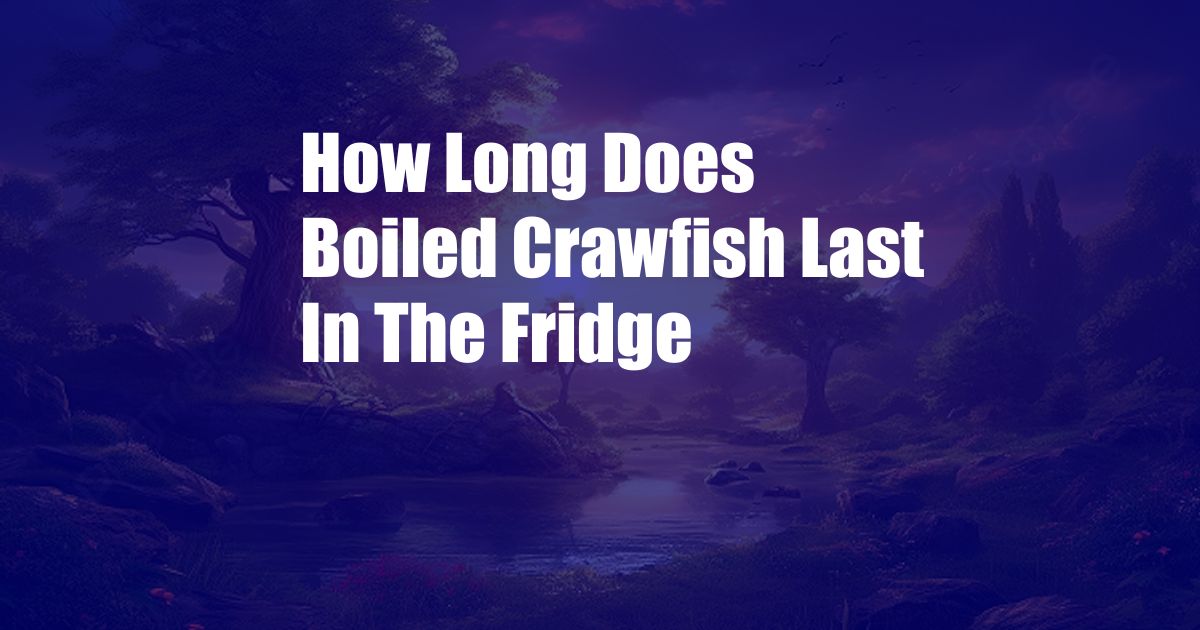
How Long Does Boiled Crawfish Last in the Fridge?
As a self-proclaimed seafood enthusiast, I’ve indulged in my fair share of boiled crawfish. Whether it’s a backyard gathering or a festive Cajun feast, I can’t resist the succulent taste of these freshwater crustaceans. However, one question that often lingers in my mind is: how long can I savor this culinary delight before it turns into a fridge casualty?
To uncover the answer, we’ll delve into the fascinating world of crawfish preservation. Join me as we explore the proper storage techniques, potential risks, and the optimal timeframe for enjoying boiled crawfish at its peak freshness.
The Art of Crawfish Refrigeration
Proper Storage Techniques for Maximum Longevity
For optimal preservation, boiled crawfish should be refrigerated promptly after cooking. Place them in an airtight container lined with a damp paper towel or fabric. The moisture will help keep the crawfish moist while preventing excessive condensation. Avoid submerging them in water, as this can dilute their flavor and make them soggy.
For extended storage, consider freezing your boiled crawfish. Spread them out on a baking sheet and freeze for several hours until solid. Once frozen, transfer them to freezer-safe bags for longer-term preservation.
Potential Risks Associated with Refrigeration
While refrigeration can extend the shelf life of boiled crawfish, it’s important to be aware of potential risks. Improper storage can lead to spoilage and the growth of harmful bacteria. To minimize these risks, adhere to the following guidelines:
- Refrigerate crawfish within two hours of cooking.
- Store crawfish for no more than three days in the refrigerator.
- Discard any crawfish that exhibit an off smell, slimy texture, or discoloration.
Timeline of Boiled Crawfish Shelf Life
The shelf life of boiled crawfish depends on several factors, including storage temperature and handling practices. Here’s a general timeline to help you plan your culinary adventures:
- Refrigerator Storage: Properly stored in an airtight container, boiled crawfish will remain fresh for up to three days.
- Freezer Storage: Frozen boiled crawfish can be stored for up to three months without compromising taste or texture.
Tips and Expert Advice for Preserving Boiled Crawfish
To enhance the longevity and flavor of your boiled crawfish, consider these tips from culinary experts:
- Use a Vacuum Sealer: Vacuum sealing boiled crawfish before freezing can significantly extend their shelf life and preserve their freshness.
- Add Lemon Juice: Squeezing a few drops of lemon juice over boiled crawfish before refrigeration can help inhibit bacterial growth.
- Freeze with Spices: Toss boiled crawfish with a sprinkle of your favorite seasonings before freezing to infuse them with extra flavor upon reheating.
FAQ on Boiled Crawfish Refrigeration
Q: Can I reheat boiled crawfish after refrigeration?
A: Yes, you can reheat boiled crawfish. Simply place them in a steamer or colander over a pot of boiling water and heat until warmed through.
Q: How do I know if my boiled crawfish have spoiled?
A: Look for signs of spoilage such as an off smell, slimy texture, or discoloration. Discard any crawfish that exhibit these characteristics.
Q: Can I boil frozen crawfish directly?
A: Yes, you can boil frozen crawfish directly. Simply place them in a pot of boiling water and cook for a slightly longer time than fresh crawfish.
Conclusion
By following proper storage techniques and adhering to the recommended timeline, you can enjoy the delightful taste of boiled crawfish without compromising safety or flavor. Whether you’re planning a backyard barbecue or simply want to savor the leftovers, remember the tips and advice presented here to extend the shelf life of your crawfish delicacies.
Are you curious to explore more culinary adventures or delve deeper into the world of seafood preservation? If so, feel free to reach out with your questions or share your own experiences in the comments below.